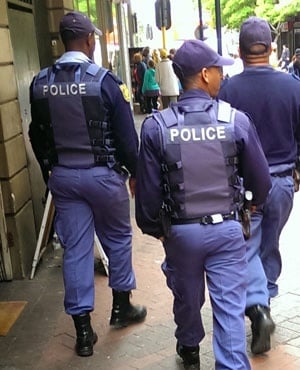
Police officers. (Duncan Alfreds, News24)
Multimedia · User Galleries · News in Pictures Send us your pictures · Send us your stories

Police officers. (Duncan Alfreds, News24)
Multimedia · User Galleries · News in Pictures Send us your pictures · Send us your stories
Zakhele Mbhele
The South African Police Service (SAPS) operates a total of 1 144 police stations in nine provinces, covering more than 1.2 million square kilometres of land, encompassing our towns and cities, as well as farms and deep rural areas.
On average, each one of its police officers is responsible for the safety of 369 citizens. Whether walking in the park or the streets, driving home from work, travelling on bus, train or taxi, at our schools or shopping malls, watching television in the supposed safety of our homes at night, you and I overall share one police officer with 368 of our neighbours.
Of course, it is unrealistic to expect that every South African be protected by their very own bodyguard. But at the very least one would expect that all South African citizens are treated equitably, as our Constitution guarantees.
However, on 11 July this year the DA received a reply which revealed that there are 1 382 SAPS personnel allocated to the Presidential Protection Service (the "PPS"). The PPS is responsible for the protection of the president and deputy president, their spouses, and all of their predecessors and their spouses. They also provide ad hoc protection to foreign dignitaries visiting South Africa.
Last year, the DA asked then minister of police, Fikile Mbalula, exactly how many people are being protected by the PPS – the answer revealed a total of 17 persons being protected year-round by the PPS. The minister did not want to reply to another question posed, which asked how many "close protectors" are assigned to the security detail of the [resident and each of the other sixteen elites that enjoy PPS protection. The minister claimed that revealing such information would compromise the security of the president.
Given the information we received this month, it is no wonder that the minister did not want to reveal this information to the DA. If you divide the 1 382 personnel members with the seventeen individuals being permanently protected by the PPS, this averages about 81 personnel members per person.
81 SAPS personnel members on average dedicated to ensuring the safety and security of the elite (and you can bet your bottom dollar that most of this was disproportionately for Jacob Zuma's benefit), while 369 South Africans have to share one SAPS member between them.
This is of course one example of how the ANC government regards the lives of ordinary South Africans as less important that the lives of their own elite.
A far more insidious example is the situation pertaining to policing in the Western Cape, and particularly in South Africa's "murder capital", Nyanga.
In the Western Cape, where gang violence and drug-related crimes are rife, the police-to-population ratio is worse than the national average, with each resident sharing a police officer with more than 500 others. The latest personnel numbers available for the Hawks' "specialised unit" on drug-related crime, the South African Narcotics Enforcement Bureau ("SANEB"), reveal that only nine officers are stationed in the Western Cape, compared to 34 officers in Gauteng.
However, more than 107 000 drug-related crimes were reported in the Western Cape in the 2016/17 financial year, compared to just under 63 000 in Gauteng, an irrationally skewed picture of resource allocation.
In Nyanga last year, 281 people were murdered, and 256 instances of rape were reported. Each of these victims were being protected by an over-worked, under-resourced police officer with the safety and well-being of 628 of their fellow Nyanga residents on their plates.
During this period, Nyanga logged the most murders in the country, as well as the highest number of sexual offences, attempted sexual offences, assaults with the intent to do grievous bodily harm and carjackings. It featured in the top ten precincts as far as rape, residential robberies, drug-related crimes, illegal firearm possession, arson and common assault is concerned.
"Top Ten" is not an accolade in this instance, but an indictment. It is an indictment on the national ANC government because in terms of section 206 of the Constitution, it is the police minister – currently Bheki Cele – who assumes responsibility for policing and for national policy that guides its operation.
The DA-run Western Cape provincial government's powers are, in terms of section 206(3) more limited to overseeing and monitoring the effectiveness and efficiency of the police and promoting good relations between communities and the police. They have done everything that is within their powers to do in order to help improve the situation.
But it is now up to the national ANC government to come to the table, and to ensure that the SAPS are properly staffed, resourced and equipped. On Thursday, the DA conducted a march to push for national government to put an end to the senseless violence by properly resourcing, staffing and equipping police stations in the Western Cape, and to deploy the National Defence Force in the hotspots of acute and persistent gang-related shootings, operating under police command to stabilise the situation and promote an enabling context for intelligence-driven operations and investigations.
The ANC government has demonstrated that it can't be trusted with treating the lives of all South Africans as equally valuable, regardless of where they live or what station they occupy in life.
The only hope for the safety of the people and their communities is a change in government. Only the DA has a vision and plan, which ensures equality and a caring government.
- Mbhele is DA shadow minister of police and Member of Parliament.
Disclaimer: News24 encourages freedom of speech and the expression of diverse views. The views of columnists published on News24 are therefore their own and do not necessarily represent the views of News24.